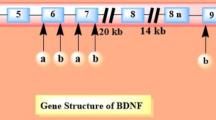Summary.
Nerve growth factor (NGF) is the prototype of related neurotrophic proteins, the so-called neurotrophins. NGF is essential for proper development of sympathetic and neural crest-derived sensory neurons of the peripheral nervous system (PNS) as well as of the neurons in the cholinergic basal forebrain (CBF). In the mature peripheral and central nervous system (CNS) NGF is also biologically active; NGF facilitates neuronal plasticity and regulates synaptic transmission and connectivity. Besides this well established neurotrophic function, recent findings suggest a role of NGF in neuroimmune and stress-associated processes, which NGF imparts not only as the classical "target-derived messenger", that is retrogradly transported within NGF-sensitive neurons, but also as para- and autocrine cytokine modulating the function of non-neuronal cells..
Since neurotrophins are produced in very small amounts in vivo, NGF-sensitive cells have to compete for the limited NGF even under physiological conditions, so that normally only less than 10% of NGF receptors (NGFR) are saturated with their endogenous ligand. Consequently, it is feasable that minute changes in NGF concentrations can influence neuronal function in an extensive way. Hence, one plausible pathomechanism of disease(s) may be that a deficiency in NGF leads to malfunction of NGF-sensitive neurons. The change in NGF concentrations in the course of several diseases, namely during alcoholic and diabetic neuropathy as well as in Alzheimer's disease (AD) and several lesion-models of the CBF, indicates that fluctuations of endogenous NGF concentrations in PNS and CNS follow a distinctive pattern. An initial deficit of NGF at the onset of pathological processes is typically followed by its temporary elevation, during which some neuronal deficits may be partially ameliorated. However, if the disease progresses a decrease of NGF is typically observed, which appears to be a "normalization" of formerly elevated NGF concentrations. In our hypothesis we postulate that after acute or chronic injuries NGF is up-regulated as an intrinsic attempt to regenerate NGF-sensitive neurons. After long-term exposure to noxious processes, however, this compensatory increase of NGF cannot be maintained and eventually breaks down. The extent of such a compensatory up-regulation may depend on age and condition of NGF-sensitive neurons as well as on the type of lesion (acute or chronic). Furthermore, we also postulate that an exceeding level of NGF or its chronic elevation could even be detrimental to neuronal functioning under certain conditions..
Thus, endogenous NGF has the capacity to modulate and even to compensate different kinds of harmful processes and in this way it may reinstate the homeostatic equilibrium. In our view, it seems to be a more appropriate app-roach to regard NGF changes as independent of classical constructs of neuropsychiatric diseases. Perhaps our understanding of NGF may even model for a new approach to the aetiology of multifactorial neuropsychiatric disorders.
Similar content being viewed by others
Additional information
Received December 22, 1997; accepted March 11, 1998
Rights and permissions
About this article
Cite this article
Hellweg, R., von Richthofen, S., Anders, D. et al. The time course of nerve growth factor content in different neuropsychiatric diseases – a unifying hypothesis. J Neural Transm 105, 871–903 (1998). https://doi.org/10.1007/s007020050100
Issue Date:
DOI: https://doi.org/10.1007/s007020050100




